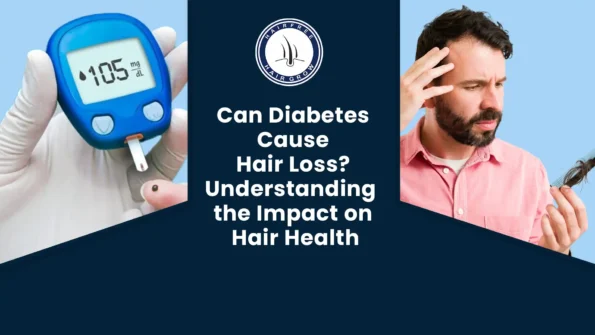Diabetes is known to impact many aspects of life, including your hair health. Hair loss is one of the lesser-known yet significant effects that people with diabetes may experience. This condition can lead to more than just thinning hair; it can also result in complete hair loss in some cases. Let’s explore: can diabetes cause hair loss and what you can do about it.
Understanding the Connection Between Diabetes and Hair Loss
Diabetes, especially when not well-controlled, can lead to high blood sugar levels. This impacts your immune system and blood circulation, which are crucial for healthy hair growth. Poor blood circulation can reduce the oxygen and nutrients reaching your hair follicles, making them weaker and leading to hair fall. In severe cases, it may even trigger conditions like alopecia, where hair falls out in patches or even entirely.
Common Causes of Hair Loss in Diabetic Patients
Several factors can contribute to hair loss when you have diabetes:
- Poor Blood Circulation: When blood circulation is compromised, hair follicles do not get the nutrients they need, leading to hair shedding and thinning.
- Stress and Hormonal Changes: Stress is a common trigger for hair loss, and people with diabetes often experience stress from managing the condition. Hormonal fluctuations during pregnancy or due to stress can also make hair loss worse.
- Blood Sugar Imbalances: Fluctuating blood sugar levels can cause your hair to shed more than usual. According to experts, losing 50 to 100 strands of hair daily is normal, but this can increase significantly if your blood sugar isn’t stable.
Autoimmune Disorders and Diabetes-Related Hair Loss
Type 1 diabetes is closely linked with autoimmune disorders. One of the common ones related to hair loss is Alopecia Areata, where your immune system mistakenly attacks hair follicles, causing hair to fall out in patches. In some cases, this can affect not only your scalp but also your body hair.
The Role of Insulin Resistance and High Blood Sugar Levels
Hyperglycemia (high blood sugar) is often associated with either a lack of insulin or insulin resistance. This condition can damage both small and large blood vessels (microvascular and macrovascular damage), affecting the flow of blood to your hair follicles. When blood flow is reduced, hair follicles become weak and can even stop producing hair altogether.
Thyroid Disorders and Hormonal Imbalances in Diabetic Patients
Diabetes is also linked with thyroid disorders, which can impact hair growth. Imbalances in thyroid hormones can make hair thin and brittle. Additionally, high levels of the stress hormone cortisol, which is common in diabetes, can harm hair follicles and cause them to stop functioning.
How to Prevent Hair Loss for Diabetic Patients
Managing hair loss when you have diabetes starts with controlling your blood sugar levels. Here are a few tips that can help:
Keep Blood Sugar in Check:
Regular monitoring and managing your blood sugar levels with diet, medication, and exercise is the most effective way to prevent hair loss.
Follow Your Doctor’s Advice:
Medications prescribed by your doctor can help control hair loss, so be sure to take them as recommended.
Incorporate Yoga and Exercise:
Regular physical activity can improve blood circulation, reduce stress, and help manage diabetes, indirectly benefiting your hair health.
Eat a Balanced Diet:
Nutrient-rich foods support healthy hair growth. Focus on a diet rich in vitamins, minerals, and protein.
Conclusion
Hair loss can be a frustrating side effect of diabetes, but it’s not something you have to live with. By managing your blood sugar levels, following a healthy lifestyle, and seeking proper medical advice, you can reduce the chances of hair loss and maintain healthy hair. Always consult with a healthcare provider if you notice excessive hair loss or are concerned about managing your diabetes effectively.
If you’re noticing unusual hair fall, it’s wise to visit HairFree HairGrow Clinic, we can guide you through effective treatments tailored to your needs.
Written By
MD (Skin & VD)
Dr. Chintan Bhavsar is a leading hair restoration expert specializing in understanding the link between diabetes and hair loss. With extensive experience, he provides effective solutions for patients concerned about the question, Can Diabetes Cause Hair Loss? ensuring healthier hair and scalp care.
Disclaimer
We’ve made all possible efforts to ensure that the information provided here is accurate, up-to-date and complete, however, it should not be treated as a substitute for professional medical advice, diagnosis or treatment. See Detailed Disclaimers Here.


